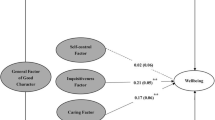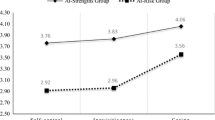Abstract
Positive psychology studies mostly focus on positive aspects of character strengths (CSs) and their role in optimal human functioning, thereby leaving the strengths’ imbalance model and its impact on negative outcomes behind. The study aims to explore the under/over and optimal use of character strengths in relation to positive and negative coping strategies and to define how the different degrees of strengths contribute to psychological resilience and negative emotional states. A total of 306 respondents (60% male) from Georgia participated in the study. The following measures were used to assess different aspects of character, coping mechanisms, and positive and negative outcomes: Underuse/Optimal Use Inventory of Strengths; Ways of Coping Questionnaire; Brief Resilience Scale; Depression Anxiety Stress Scale. The results revealed that underuse and overuse of character strength are positively related to negative coping strategies and negative emotional states, whereas optimal use of character strength is associated with positive coping strategies and resilience. Positive and negative coping strategies play a mediator role in these relationships. The results call for support for a theoretical model of the dark sides of character strengths by providing insights into how each degree of character strength corresponds to positive or negative aspects of human well-being and coping strategies. A novel mechanism for explaining character strength and positive and negative outcomes relationship is explored.

Similar content being viewed by others
Data Availability
The dataset generated and analyzed during the current study is not publicly available due to the fact that it constitutes an excerpt of research in progress but it will be available from the corresponding author on reasonable request.
References
Andrewes, H. E., Walker, V., & O’Neill, B. (2014). Exploring the use of positive psychology interventions in brain injury survivors with challenging behavior. Brain Injury, 28(7), 965–971.
Barton, Y. A., Barkin, S. H., & Miller, L. (2017). Deconstructing depression: A latent profile analysis of potential depressive subtypes in emerging adults. Spirituality in Clinical Practice, 4(1), 1–21. https://doi.org/10.1037/scp0000126
Baumann, D., Ruch, W., Margelisch, K., Gander, F., & Wagner, L. (2019). Character strengths and life satisfaction in later life: An analysis of different living conditions. Applied Research in Quality of Life. https://doi.org/10.1007/s11482-018-9689-x
Bergen, A. (2019). Adult character strength use and its relationship to physical and mental health. [Doctoral dissertation], Walden University.
Day, A. L., & Livingstone, H. A. (2001). Chronic and acute stressors among military personnel: Do coping styles buffer their negative impact on health? Journal of Occupational Health Psychology, 6(4), 348–360. https://doi.org/10.1037/1076-8998.6.4.348
Dempsey, M. (2002). Negative coping as mediator in the relation between violence and outcomes: Inner-city African American youth. American Journal of Orthopsychiatry, 72(1), 102–109.
Folkman, S., & Lazarus, R. (1988). Manual for the ways of coping questionnaire. Consulting Psychologists Press.
Folkman, S., Lazarus, R., Dunkel-Schetter, D., Delongis, A., & Gruen, R. (1986). Dynamics of a stressful encounter: Cognitive appraisal, coping and encounter outcomes. Journal of Personality and Social Psychology, 50(5), 992–1003. https://doi.org/10.1037/0022-3514.50.5.992
Freidlin, P., Littman-Ovadia, H., & Niemiec, R. M. (2017). Positive psychopathology: Social anxiety via character strengths underuse and overuse. Personality and Individual Differences, 108, 50–54.
Gander, F., Hofmann, J., Proyer, R. T., & Ruch, W. (2019). Character strengths – Stability, change, and relationships with well-being changes. Applied Research in Quality of Life. https://doi.org/10.1007/s11482-018-9690-4
Grant, A. M., & Schwartz, B. (2011). Too much of a good thing: The challenge and opportunity of the inverted u. Perspectives on Psychological Science, 6(1), 61–76. https://doi.org/10.1177/1745691610393523
Gustems-Carnicer, J., & Calderón, C. (2015). Virtues and character strengths related to approach coping strategies of college students. Social Psychology of Education, 19(1), 77–95. https://doi.org/10.1007/s11218-015-9305-y
Harzer, C., & Ruch, W. (2015). The relationships of character strengths with coping, work-related stress, and job satisfaction. Frontiers in Psychology, 6, 165. https://doi.org/10.3389/fpsyg.2015.00165
Hausler, M., Strecker, C., Huber, A., Brenner, M., Höge, T., & Höfer, S. (2017). Associations between the application of signature character strengths, health and well-being of health professionals. Frontiers in Psychology, 8, 1307. https://doi.org/10.3389/fpsyg.2017.01307
Hayes, A. F. (2018). Introduction to mediation, moderation, and conditional process analysis: A regression-based approach. The Guilford Press.
Jayawickreme, E., & Blackie, L. E. R. (2018). Psychopathology and languishing are distinct. Journal of Positive Psychology. Advance online publication. https://doi.org/10.1080/17439760.2018.1528379
John, O. P., & Srivastava, S. (1999). The big five trait taxonomy: History, measurement, and theoretical perspectives. In L. A. Pervin & O. P. John (Eds.), Handbook of personality, second edition: Theory and research (pp. 102–138). Guilford Press.
Keyes, C. L. (2002). The mental health continuum: From languishing to flourishing in life. Journal of Health and Social Behavior, 43(2), 207–222.
Kim, H. R., Kim, S. M., Hong, J. S., Han, D. H., Yoo, S.-K., Min, K. J., & Lee, Y. S. (2018). Character strengths as protective factors against depression and suicidality among male and female employees. BMC Public Health, 18(1). https://doi.org/10.1186/s12889-018-5997-1
Lazarus, R., & Folkman, S. (1984). Stress, appraisal, and coping. Springer.
Le, H., Oh, I.-S., Robbins, S. B., Ilies, R., Holland, E., & Westrick, P. (2011). Too much of a good thing: Curvilinear relationships between personality traits and job performance. Journal of Applied Psychology, 96(1), 113–133.
Littman-Ovadia, H., & Freidlin, P. (2019). Positive psychopathology and positive functioning: OCD, flourishing and satisfaction with life through the lens of character strength underuse, overuse and optimal use. Applied Research in Quality of Life. https://doi.org/10.1007/s11482-018-9701-5
Lovibond, S. H., & Lovibond, P. F. (1995). Manual for the Depression Anxiety Stress Scales (2nd ed.). Psychology Foundation of Australia.
Macaskill, A., & Denovan, A. (2014). Assessing psychological health: The contribution of psychological strengths. British Journal of Guidance & Counseling, 42(3), 320–337. https://doi.org/10.1080/03069885.2014.898739
Martínez-Martí, M. L., & Ruch, W. (2016). Character strengths predict resilience over and above positive affect, self-efficacy, optimism, social support, self-esteem, and life satisfaction. The Journal of Positive Psychology, 12(2), 110–119.
Niemiec, R. M. (2013). VIA character strengths: Research and practice (the first 10 years). In H. H. Knoop & A. Delle Fave (Eds.), Well-being and cultures: Perspectives from positive psychology, cross-cultural advancements in positive psychology (pp. 11–29). Springer.
Niemiec, R. M. (2014). Mindfulness and character strengths: A practical guide to flourishing. Hogrefe.
Niemiec, R. M. (2018). Character strengths interventions: A field guide for practitioners. Hogrefe.
Niemiec, R. M. (2019a). Finding the golden mean: The overuse, underuse, and optimal use of character strengths. Counselling Psychology Quarterly, 32(7), 1–19. https://doi.org/10.1080/09515070.2019.1617674
Niemiec, R. M. (2019b). Six functions of character strengths for thriving at times of adversity and opportunity: A theoretical perspective. Applied Research in Quality of Life. https://doi.org/10.1007/s11482-018-9692-2
Peterson, C. (2006). Character strengths. A primer in positive psychology. Oxford University Press.
Peterson, C., & Seligman, M. E. P. (2004). Character strengths and virtues: A handbook and classification. Oxford University Press and American Psychological Association.
Peterson, C., Ruch, W., Beerman, U., Park, N., & Seligman, M. E. P. (2007). Strengths of character, orientations to happiness, and life satisfaction. Journal of Positive Psychology, 2, 149–156.
Sawyer, M. G., Pfeiffer, S., & Spence, S. H. (2009). Life events, coping and depressive symptoms among young adolescents. Journal of Affective Disorders, 117(1–2), 48–54.
Seligman, M. E. P., Steen, T. A., Park, N., & Peterson, C. (2005). Positive psychology progress: Empirical validation of interventions. American Psychologist, 60(5), 410–421. https://doi.org/10.1037/0003-066X.60.5.410
Seery, M. D., Holman, E. A., & Silver, R. C. (2010). Whatever does not kill us: Cumulative lifetime adversity, vulnerability, and resilience. Journal of Personality and Social Psychology, 99, 1025–1041. https://doi.org/10.1037/a0021344
Shoshani, A., & Slone, M. (2016). The resilience function of character strengths in the face of war and protracted conflict. Frontiers in Psychology, 6. doi: https://doi.org/10.3389/fpsyg.2015.02006https://doi.org/10.3389/fpsyg.2015.02006
Sims, A., Barker, C., Price, C., & Fornells-Ambrojo, M. (2015). Psychological impact of identifying character strengths in people with psychosis. Psychosis: Psychological, Social and Integrative Approaches, 7(2), 179–182. https://doi.org/10.1080/17522439.2014.925485
Smith, B. W., Dalen, J., Wiggins, K., Tooley, E., Christopher, P., & Bernard, J. (2008). The brief resilience scale: Assessing the ability to bounce back. International Journal of Behavioral Medicine, 15(3), 194–200. https://doi.org/10.1080/10705500802222972
Snow, N. (2016). Virtue acquisition: The paradox of striving. Journal of Moral Education, 45(2), 179–191. https://doi.org/10.1080/03057240.2016.1181617
Thompson, N. J., Fiorillo, D., Rothbaum, B. O., Ressler, K. J., & Michopoulos, V. (2018). Coping strategies as mediators in relation to resilience and posttraumatic stress disorder. Journal of Affective Disorders, 225, 153–159. https://doi.org/10.1016/j.jad.2017.08.049
Vertilo, V., & Gibson, J. M. (2014). Influence of character strengths on mental health stigma. Journal of Positive Psychology, 9(3), 266–275.
Funding
The study was funded by Shota Rustaveli National Science Foundation of Georgia (PHDF-18–1532).
Author information
Authors and Affiliations
Contributions
T.K. conceived the presented idea, developed the theory and design of the study, carried out the experiment, and performed the computations. Kh. M. verified the analytical methods and supervised the findings of this work. Both authors discussed the results and contributed to the final manuscript.
Corresponding author
Ethics declarations
Ethics approval
The ethical evaluating committee of National Science Foundation assessed the ethical aspects of the project.
Consent to Participate
Not applicable.
Conflict of Interest
The authors declare no competing interests.
Rights and permissions
About this article
Cite this article
Kamushadze, T., Martskvishvili, K. Character Strength at Its Worst and Best: Mediating Effect of Coping Strategies. Trends in Psychol. 29, 655–669 (2021). https://doi.org/10.1007/s43076-021-00085-z
Accepted:
Published:
Issue Date:
DOI: https://doi.org/10.1007/s43076-021-00085-z




